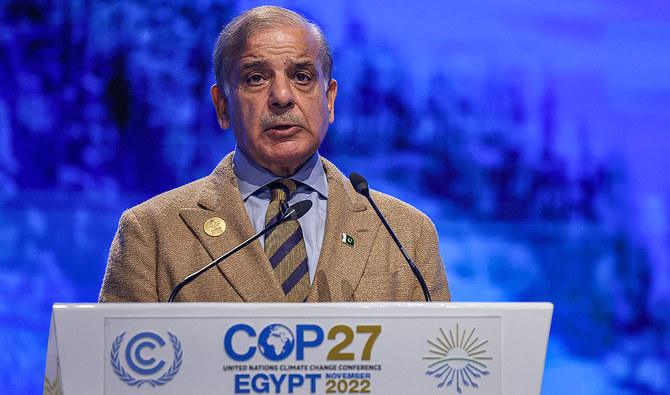ISLAMABAD: Pakistan’s Prime Minister Shehbaz Sharif on Sunday called on industrialized countries to fulfill their climate finance commitments and said his country was facing “the brunt of natural calamities” due to carbon emissions elsewhere in the world, foreign media reported.
Climate negotiators at the COP27 conference in Egypt this month reached a breakthrough funding deal to help poor countries ravaged by climate change.
Pakistan, as Chair of the Group of 77 and China, galvanized support for the establishment of the fund at COP27 in the Egyptian Red Sea resort of Sharm el-Sheikh, first by having it placed on the agenda of the conference and then pushing for a consensus agreement.
Islamabad said at the time it looked forward to early operationalization of the fund, hoping that it would bridge a major gap in the climate finance architecture.
“There is an urgent need for the industrialized countries to meet their climate finance commitments, with a balanced focus on adaptation and mitigation,” Sharif told Turkiye’s Anadolu news agency.
He welcomed the deal to establish the “loss and damage fund” to compensate developing countries most severely impacted by climate change, but suggested the international community explore possibilities of “debt swaps for climate action, particularly adaptation.”
Pakistan witnessed one of the deadliest monsoon seasons of its history this year, with torrential rains and floods killing more the 1,700 people.
The climate-induced floods affected 33 million people and cost more than $30 billion in damages to the South Asian economy.
About the response to the situation after the floods, Sharif said his country had mounted coordinated rescue and relief operations, mobilizing “all possible resources and capacities,” according to the report.
He said a dedicated National Flood Response and Coordination Center (NFRCC) had been set up to effectively coordinate these operations.
“The NFRCC is working on rehabilitation plans as the flood waters recede,” he said.
“This is a national effort in which everyone is contributing, from individual Pakistanis from all spheres of life to businesses, civil society, and humanitarian organizations, besides civil and military administrations.”
Recalling a visit to Pakistan’s flood-hit areas by UN secretary general, Sharif said Antonio Guterres had repeatedly stated that “’countries like Pakistan, who have done almost nothing to contribute to global warming, do not deserve to be among the frontline countries impacted the most by climate change’.”
“I reiterate his words that it is not just a matter of solidarity but a matter of justice. This phenomenon of death, devastation, and destruction is driven by climate change, the causes of which are global,” the Pakistani premier said. “Therefore, the response calls for international solidarity and collective action.”
Pakistan contributes less than 1 percent of the global greenhouse gas emissions, but the South Asian country is among the ten most climate-stressed nations.
















